The Last Enemy
Introduction
Obsessive compulsive mathematician Stephen Ezard (Dominic Cumberbatch) interrupts his research in China and returns to the UK for the funeral of his brother Michael (Max Beesley), an aid worker killed in Afghanistan by a landmine. The country is a very different place to the one he left, ID cards are now standard issue and there is a heavy and aggressive police presence on the streets. Stephen is asked by old friend Eleanor Brooke, now a Government Minister, to front the campaign to persuade Parliament to bring a new surveillance database into law, it will link ID cards with all sorts of data across the public domain including shopping habits, political affiliations and banking. Also linking into the vast CCTV camera array, TIA (Total Information Access) will allow the Government to pull up data on any suspected individual from a vast array of databases linked into TIA and will also allow both real time surveillance and historical surveillance.
In Michael's flat is his widow Yasmin Anwar (Anamaria Marinca), a doctor who was working in the same camp as her husband until his death. She is looking after a severely ill female aid worker, whose illness may well be linked to a series of deaths on the Afghan-Pakistan border. The girl dies and both she and Anwar suddenly disappear, leaving the obsessive Ezard in a panic. Despite his initial refusal to become involved in TIA, he decides to help in order to gain access to the system and trace Anwar.
Watching developments are two groups. The first is led by the mysterious Russell (Robert Carlyle), possibly a rogue Government Agent, whilst the second group are pure Whitehall government employees with something to hide. Barbara Turney (Geraldine James) works at the centre of power in the Cabinet Office and is joined in this conspiracy by George Gibbon (Christopher Fulford) from the Joint Intelligence Committee (JIC) and Patrick Nye (David Harewood), a senior officer at British Intelligence.
Stephen is drawn deeper into the conspiracy when he discovers the dead girl is the step daughter of Russell, and he's a man on a mission to discover what happened to her…
Visual
If there's one thing the BBC drama department know how to do well, it's cinematography. Nigel Willoughby is the man responsible, other works on TV include Spooks, Trial and Retribution, and Sharpe's Challenge. Colours are deep and full, some of the shots are very impressive.
Although it also looks very nice, as usual the TIA computer system is completely unrealistic and ultra fast with razor sharp imagery. I know it's fiction, but this is a Public Sector IT project we're talking about here…
Audio
There's a quite bombastic attempt at a dramatic soundtrack from Magnus Fiennes, borrowing at times from the Harold Faltermayer's Top Gun Theme (well, for the bells at least…). Nice music but unfortunately doesn't really fit with the pace of the piece overall.
As usual with a Playback release, no sodding subtitles. Why???
Extras
Making Of - 30 minute effort that doesn't really tell us much about the series itself, but interesting in a way for a minor understanding of how various shots were set up.
Outtakes - very short, very dull
Deleted Scenes - very short, no real context or why they were dropped. Just as well though…
Photo Gallery - very well done, slideshow with music and the quality of the shots is quite impressive.
Overall
There are 5 million CCTV cameras in the UK currently, that's approximately one for every twelve people. That's an awful lot of cameras and an increasing army of people to monitor them, although it has to be asked just what use these cameras are really. Along with the proposed ID cards for the country, the cameras are supposed to be a deterrent but seemingly seem to only be able to piece together evidence after a major incident rather than stopping it in its tracks. This must be down to the inadequacy of joined up systems and the ability for real time interrogation of these systems as well as lack of resources and quite possibly an intelligence failure, despite commonly held belief that our intelligence services do a good job.
That may be beyond doubt, but there's only so much that any intelligence, police or government service can do to uncover fraudulent or criminal activity. The answer, seemingly, is ever more intelligence and linked up databases. There's no argument that a central database has some logical benefit for certain government departments and police services who all use different systems and cannot share data that they really should be able to. There is a difference in opinion between our current Government and the majority of the public as to exactly what information needs to be held on such databases and for what purpose. There's no doubt that we've entered a new age of terrorism since 9/11, which is the justification for ever more stringent anti-terror laws, but laws that were spun as helping in the US-proclaimed War On Terror have been used in ways not foreseen by the public who allowed our politicians to bring these laws into force. Who would have believed that laws designed to restrict terrorism could be subverted to allow the ejection and detention of an 82 year old activist for heckling the Foreign Secretary at a Labour Party conference? Or that they could be used to halt the legitimate right to protest? Whilst laws can be passed with the best of intentions, they can easily be subverted if ambiguity exists in the text.
The Last Enemy attempts to show what might just happen to the United Kingdom in the near future if Identity Cards become the norm and ever increasing powers are passed in the name of anti-terror. It's a slow burning drama and is side tracked with a plot thread about viruses that is ultimately linked and wrapped up, asking some serious questions about the potential for a truly Orwellian future. The TIA system shown here not only allows total surveillance and information gathering on anybody who carries an ID card and is part of mainstream society, but can also shut people out of society completely quite quickly. The scenario here shows the central character having his ID card data changed so that he cannot enter public and domestic buildings or even withdraw any money from an ATM, effectively excluded from society and a target for aggressive police action. Farfetched? People believe data held on computers, and Government departments hold the most power over individuals.
There are plot holes, but as a thought provoking drama I can overlook some clumsy attempts at a total Orwellian society. We do not have the manpower or sophistication in linking proprietary systems to make an all-encompassing database like TIA, I'm not even sure it's technologically possible to do some of the things shown but then it's also true that a lot of technology is developed within Governments prior to becoming commercially available to the public . This series is probably a conspiracy theorist's wet dream, and there are questions that need to be answered. Overall it does a good job. It doesn't present the Government as evil people, simply people taking hard decisions to safeguard their country but ultimately crossing the line morally.
There are some direct influences from Hollywood here too. Robert Carlyle, as effective and superb as always, is really the UK equivalent of Gene Hackman's character in Enemy of the State with his secret hideaway in a huge abandoned warehouse but outfitted with masses of computers. There is even a brief reference to Demolition Man with an underclass society comprised of those who either willingly refused to carry ID cards or excluded from society due to their cards being barred.
It's slow, yes, and may well try the patience of some (the first episode almost did the same to me) but there are a lot of convoluted threads to be tied up in the final one and does it in the main quite satisfactorily albeit not neatly wrapped up with a happy ending.
Not bad, and thought provoking if you allow it to be.
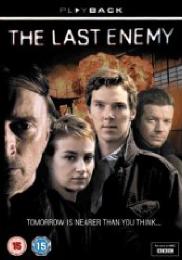
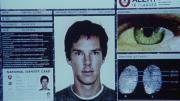
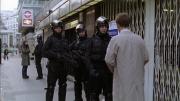
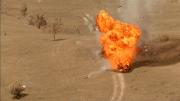

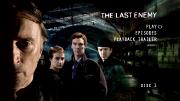


































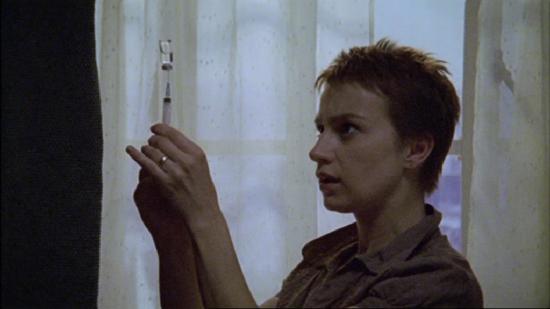


Your Opinions and Comments
Be the first to post a comment!